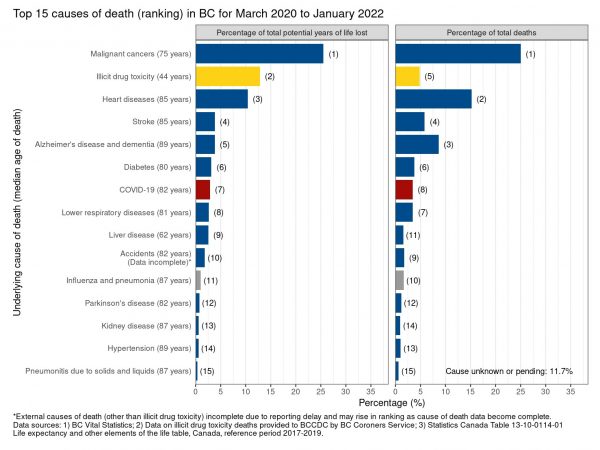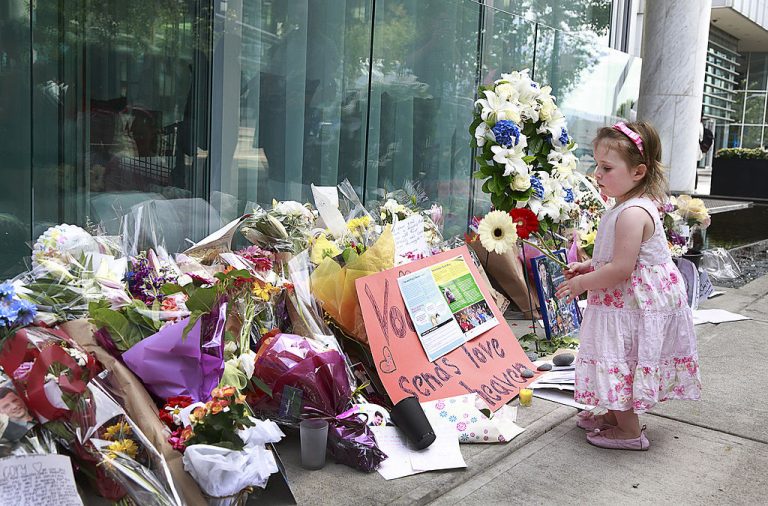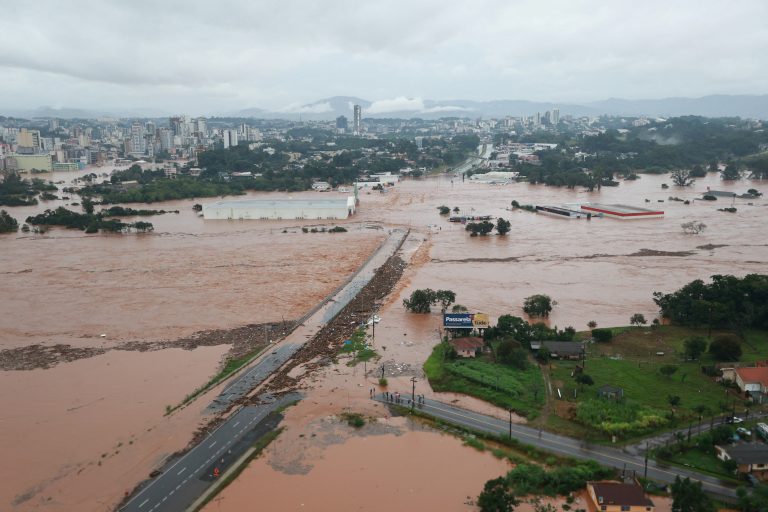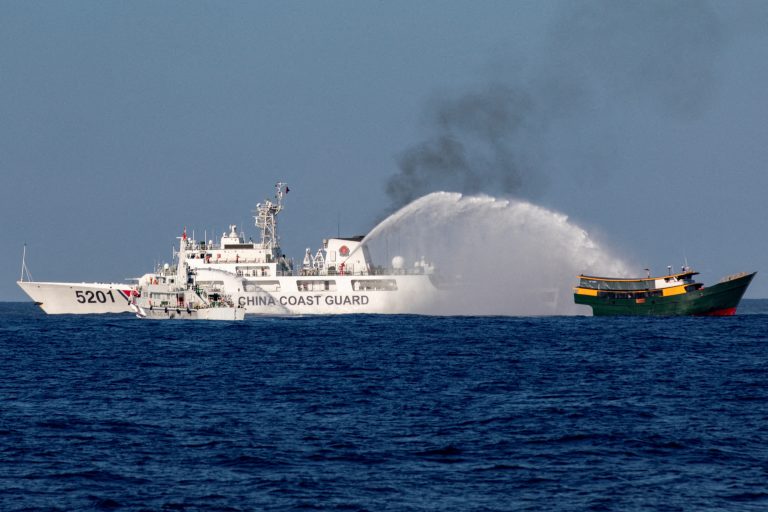The amount of human lives lost in the Canadian province of British Columbia’s opioid epidemic is outpacing that of the Coronavirus Disease 2019 (COVID-19) pseudo pandemic, data shows.
In an April 15 article by CTV News Vancouver focusing on rallies set to commemorate the upcoming 6th Anniversary of the Provincial Government’s declaration of a Public Health Emergency of an opioid crisis that has become endemic, the outlet calculated 9,410 total deaths.
The figure worked out to an average annual death toll of 1,568, which stood in stark contrast to the 1,502 figure for COVID-associated deaths.
RELATED READING:
- Chinese National Claiming $40,000 Annual Income Buys $32 Million in Vancouver Real Estate
- BMW, Mercedes Export Scheme to China Plagues Canadian Dealers
An April 13 wire release by The Canadian Press cited Lisa Lapointe, BC’s Chief Coroner, as stating the bulk of fatalities are occuring in the urban Vancouver, Surrey, and Victoria regions.
Additionally, Lapointe revealed that 174 deaths were registered in February alone.
Success
You are now signed up for our newsletter
Success
Check your email to complete sign up
Although BC’s Weeks 5 through 8 COVID-19 Situation Reports indicate that February registered 215 COVID-associated deaths, the BC Centre for Disease Control’s Mortality Context App shows a wider picture.

The App calculates provincial mortality rates from March of 2020 to January of 2022, showing that among the top 15 causes of death, illicit drug toxicity ranks in second place at close to 5 percent, while COVID-19 ranks seventh at close to 3 percent.
In terms of median age of death, illicit drug toxicity once again won an unfortunate race with a shocking median fatality age of 44 versus 82 for COVID.
Moreover, estimates for average time of life lost amount to 12 years for illegal drug fatalities compared to roughly 2.5 for COVID patients.
For perspective, the top ranking killer in BC is malignant cancers, amounting to 25 percent of all deaths, an average age of 75, and an estimated life expectancy loss of more than 25 years.
MORE ARTICLES:
- Mexican Drug Cartels Laundering Money Through China’s Triads After Championing US Fentanyl Push
- Working Age People Are Dying: Some States Saw 60% More 18-49 Year-old Fatalities in 2021, but It’s Not All COVID
On April 11, media reported that Canada Post was suspending deliveries in Vancouver’s East Hastings Street, arguably the most notorious drug trafficking and drug use hotspot in all of Canada, after employees complained of safety concerns and harassment.
Blood red roots
Sam Cooper, currently an investigative journalist with Global News, spent much of his career investigating a long running drug trafficking and money laundering scandal involving the Chinese Triad mafia during his tenure with the Vancouver Sun and Vancouver Province.
Cooper also authored the book Wilful Blindness: How a Network Of Narcos, Tycoons and CCP Agents Infiltrated the West in 2021.
He told American Thought Leaders in June the text has extensively documented “about 10 years of my personal reporting in discovering this convergence of the party run out of Beijing, the Communist Party, and how it co-ops and uses, really, any tool at its disposal.”
The journalist stated that he began to uncover the scheme when he started looking into what was behind the anomalous and astronomical rise of the Vancouver real estate market.
“My book, again, shows cases where state actors in China are seen to be directing these drug trafficking organizations in Vancouver and intervening in gang conflicts between various Triads. So that is proof that someone very powerful in Beijing does control gangs,” said Cooper.
Cooper discovered that much was tied to an “underground banking model” mimicking what transpired in Macau and Hong Kong’s casinos, being undertaken by CCP-backed Triad sects such as the Big Circle Boys through BC’s provincially run casinos.
“I was finding that this was happening in Canada. Really, the journey of discovery is Canada, especially the city of Vancouver, which has become a global node in the Party’s efforts to infiltrate democratic societies through purchases of real estate, through efforts to get into technology companies in Western nations, and through the use of tycoons and industrialists that travel the world playing Baccarat,” Cooper stated.
“And while they’re playing Baccarat, they’re not just entertaining themselves. They are exporting capital.”
Cooper explained how the scheme works, “So when they sell fentanyl, cocaine, methamphetamines, or ecstasy on the street, they get $20 bills. They’re often soiled. We know that because of deaths in cities like Vancouver from fentanyl heroin overdoses. But they create a huge volume, literally warehouses of $20 bills.”
“They’re useless for the drug trafficking organizations unless they can get the volume down.”
He continued, “How do they do that? One of the simplest ways and the most apparent ways in Vancouver casinos is that the drug trafficking organizations hire loan sharks, or runners, as they’re called, to go into the casino. They identify high rolling gamblers, and they provide these $20 bills, $10,000 bundles wrapped in elastic bands, in the manner of street drug trafficking.”
And concluded, “The VIP gamblers go to the casino cash cage. They get their chips, which have values of up to $5,000. They gamble and they can receive, if they win and if they’re lucky, they can get a casino check. The money laundering can flow from that.”
“You can see how quickly you can get a down payment if you have a check for $500,000 to buy a home. Or, simply, the $20 bills are exchanged for clean $100 bills wrapped to Canadian banking standards.”
Forming a ‘united front’
A 2018 report under the Trump Administration by the U.S.-China Economic and Security Review Commission collaborates Cooper’s reporting as it describes the United Front as a method of work “to co-opt and neutralize sources of potential opposition to the policies and authority of its ruling Chinese Communist Party.”
The report elaborates, “A number of other key affiliated organizations guided by China’s broader United Front strategy conduct influence operations targeting foreign actors and states. Some of these entities have clear connections to the CCP’s United Front strategy, while others’ linkage is less explicit.”
And explains further how the obfuscated nature of the program creates ambiguity in the public eye that serves as shadows for the operation to conceal its tentacles, “It is precisely the nature of United Front work to seek influence through connections that are difficult to publically prove and to gain influence that is interwoven with sensitive issues such as ethnic, political, and national identity, making those who seek to identify the negative effects of such influence vulnerable to accusations of prejudice.”
Cooper explained during his interview, “It took me a long time, but I did discover that leaders of these United Front organizations had connections to people that I knew from my RCMP documents, who were serious high level suspects in the casino money laundering rings in Vancouver.”
In April of 2020, Cooper also revealed a United Front-linked campaign that impacted Canada during the earliest part of the COVID pandemic as Chinese Consulates and Embassies utilized “used diplomatic channels, state-owned businesses and Chinese diaspora community associations” to stockpile PPE for shipment directly to the mainland.
Although the 39-page report failed to mention the Party’s overseas heroin and fentanyl trafficking operations and did not directly implicate the Triads, it did note that a “Triad-linked head” of an organization that advocates for reunification of independent Taiwan with the communist-goverened mainland had “mobilized about 200 pro-Beijing activists and Triad associates” to challenge democracy activist Joshua Wong during a 2017 visit.
During Hong Kong’s historic 2019 “Heaven Will Eliminate the CCP” (天滅中共) protests, members of the local Triad were deployed to thug ordinary passengers at the Yuen Long subway station at the bequest of Beijing-linked connections for the purposes of sending a message to citizens, an event widely covered by western establishment media.















